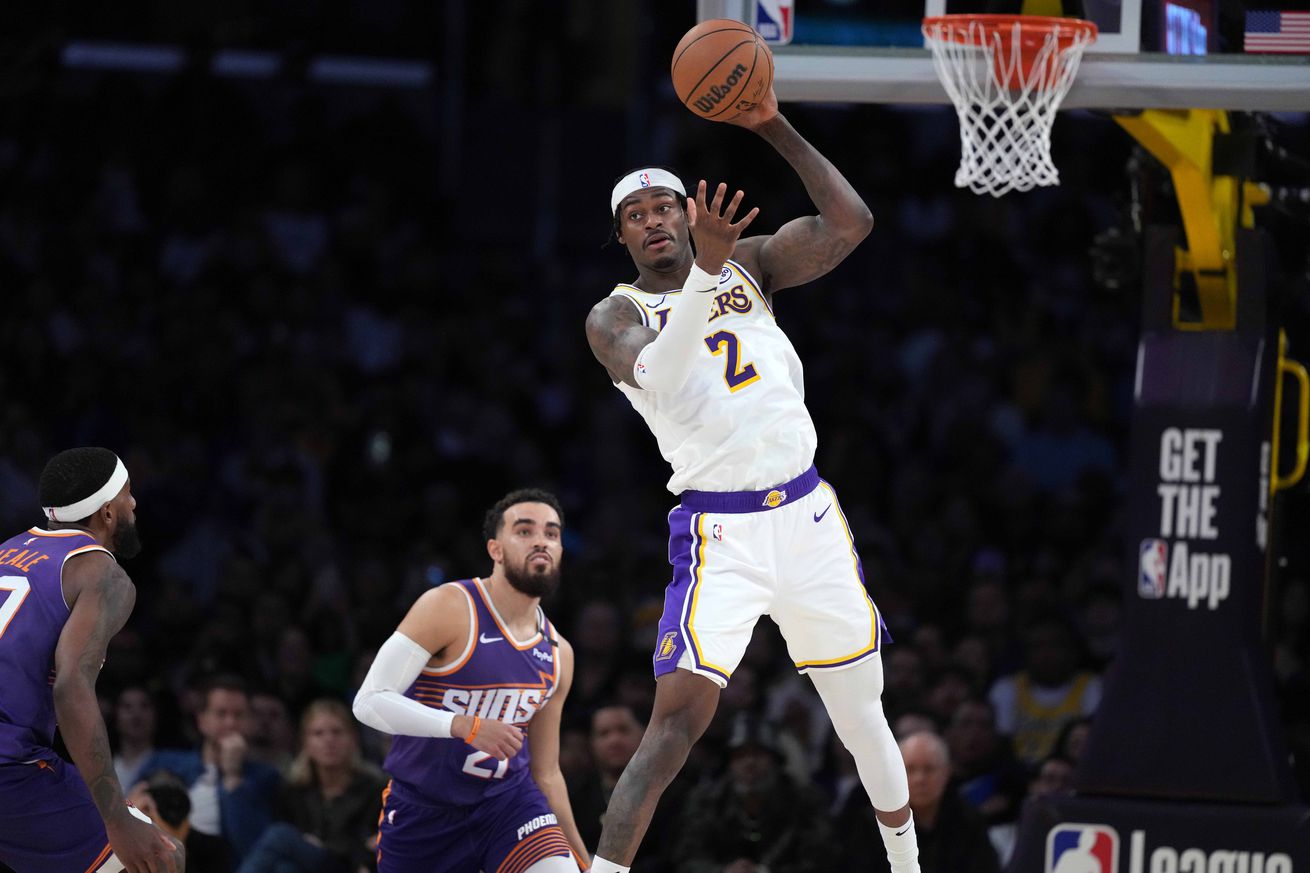
This season further proved that Jarred Vanderbilt is a superb defensive specialist but also still an incomplete player.
Welcome to our annual Lakers season in review series, where we’ll look back at each player on the team’s roster this season and evaluate if they should be part of the future of the franchise. Today, we continue with a look at Jarred Vanderbilt.
There was a lot of excitement and optimism for the return of Jarred Vanderbilt prior to the start of the regular season. As we all know, the Lakers’ offseason was relatively dull after they barely made moves around their roster last summer, which was why getting Vando back in uniform felt like a huge key addition.
But despite Rob Pelinka stating that the 6’8 forward would be ready to play by the start of the regular season after a pair of offseason surgeries, there was a frustrating setback in Vanderbilt’s recovery, which led him to miss 42 more games and delay his season debut to January.
The roughly three months that followed his debut up until the playoffs allowed fans to get the full Vando experience, which was neither all good or all bad.
It wasn’t that Vanderbilt performed horribly this season, but it felt like his flaws, especially on the offensive end, were more exposed than ever. Maybe it was because he spent all summer recovering from surgery, but what this season proved was that the defensive specialist is an incomplete player who can’t always be relied on.
How did he play?
Vando wasted no time in making his defensive presence felt as soon as he made his debut in the Lakers’ 118-108 victory against the Golden State Warriors on the road in January. His hustle, energy and competitive spirit on the defensive end is so contagious that it regularly boils over to the team.
One underrated part about Vanderbilt’s game, which we oftentimes saw this year, is that he pushes the pace and creates fastbreak opportunities so well that it benefited the Lakers instantly once he returned.
The forward’s defense and rebounding were a welcome sight, especially since those were the two departments the Lakers significantly struggled in prior to the franchise-altering trade for Luka Dončić. It’s not a coincidence that LA’s team rebounds (43.6) and steals (8.0) per game increased once Vando returned to the lineup.
But the positives tagged along with the negatives as well, which were visible offensively. In JJ Redick’s system that emphasizes spacing, ball movement and shooting, Vanderbilt stood out in the worst way possible.
In his 16.1 minutes per game, Vando averaged just 4.1 points on 28.1% 3-point shooting as well as 48.8% from the field. The 11-year veteran attempted exactly 32 3-pointers in the regular season but only converted nine of them.
As a result, Vando saw a decrease in minutes from last year, which could also be because LA learned more into small ball and had quality forward options like Dorian Finney-Smith, Rui Hachimura and even LeBron James as well. The thing with these three aforementioned names is that they’re never really left alone on the perimeter on offense, contrary to how Vanderbilt is treated.
That’s why during the playoffs, Vanderbilt’s minutes were very inconsistent. He wasn’t part of the five-man lineup that Redick lived and died with throughout the series, nor did his defense make much of a difference to cover the Lakers’ primary flaws. The slasher tallied just seven points across all five games as well 19 rebounds, which clearly weren’t enough.
There’s no doubt that Vando has had a handful of memorable games with the purple over and gold over the last three years, but his durability as well as his flaws on the court are certain issues that the team can’t overlook and this season once again proved that.
What is his contract situation moving forward?
Since he signed an extension in 2023, Vanderbilt is currently locked in with the team at least until the summer of 2027 when he has a player option. This season, he will enter the second year of his current four-year $48 million contract.
Should he be back?
If the Lakers are able to retool their roster in a way where they don’t desperately need Vanderbilt’s services to survive, then yes, he’ll most likely be welcomed back. Vando needs an elite rim-protecting big in order to fully maximize his defense, which was why he fit seamlessly on a team with Anthony Davis.
But since the Lakers are now built around two ball-dominant players in Doncic and James, the team will consider acquiring two-way players, which Vando clearly isn’t. There’s a chance he will be traded straight up or could be a filler as part of a major move, which is also one way to best take advantage of his contract.
If no attractive trade or upgrade presents itself this summer, then there are worse things Los Angeles could do than keep Vanderbilt. An offseason where he gets to focus on working on his game instead of recovering from injury, as well as the fact that he can still be serviceable in the right situation, provides hope that Vando can put together a better campaign next season.
You can follow Nicole on Twitter at @nicoleganglani.